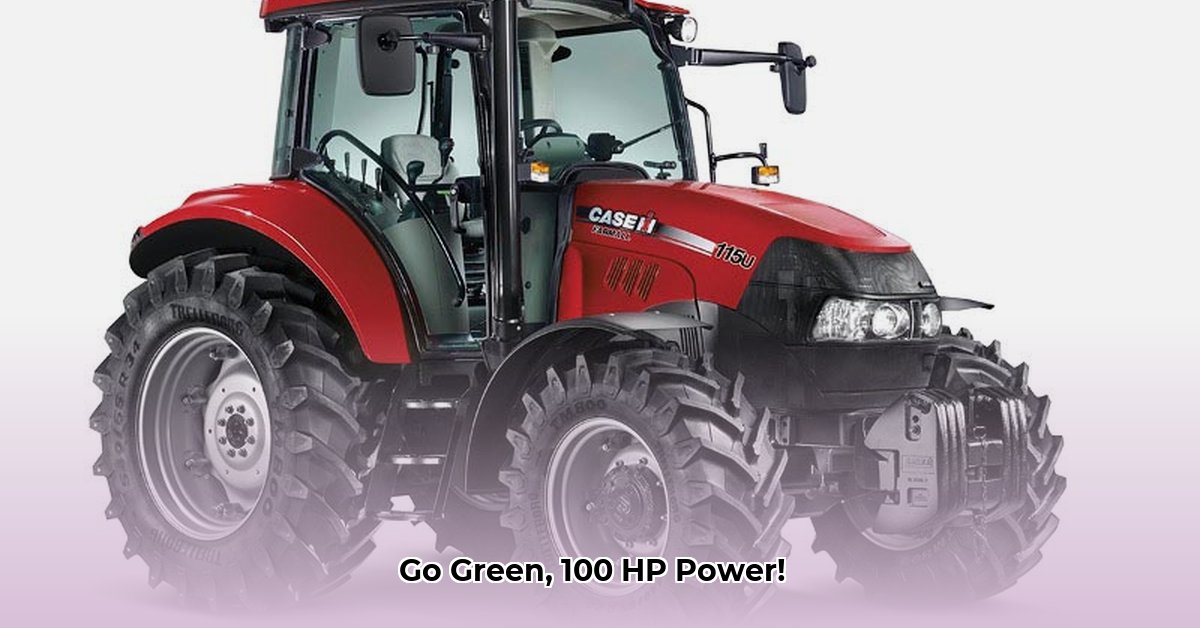
Case 100 HP Tractor: A Sustainability Assessment
The Case IH Farmall 100C represents a significant piece of equipment within the evolving landscape of sustainable agriculture. This review analyzes its potential contribution to environmentally conscious farming practices, highlighting both its merits and crucial data limitations. The analysis focuses on leveraging available data while acknowledging the need for more comprehensive information to fully assess its long-term sustainability. For more information on smaller tractors, see smaller tractor options.
Power and Efficiency: Quantifying Environmental Impact
The Farmall 100C boasts a powerful 3.4L FPT engine, available in 2WD and 4WD configurations. While horsepower ratings vary slightly across sources (ranging from 85.8 PTO hp to 99 gross hp), its capacity for efficient field work is undeniable. This translates to potential time and labor savings. However, a critical gap exists: precise fuel consumption data under real-world farming conditions. Without knowing gallons per acre consumed, a complete fuel-efficiency assessment remains impossible. This underscores the need for independent testing and improved manufacturer transparency regarding fuel consumption rates for various operational tasks. How can farmers accurately compare fuel efficiency without standardized, verifiable data?
Environmental Impact: A Comprehensive Lifecycle Perspective
The Farmall 100C complies with stringent emission standards (Tier 4B/Final), a positive step toward reduced emissions. However, this is only a partial picture of its environmental impact. A full assessment demands a comprehensive lifecycle assessment (LCA), encompassing:
- Manufacturing: Greenhouse gas emissions during production and material sourcing.
- Operation: Fuel consumption and operational emissions over the tractor's lifespan.
- Maintenance: Environmental impact of repairs and component replacement.
- End-of-Life: Disposal methods and the potential for recycling and reuse of components.
The absence of a complete LCA prevents a comprehensive environmental impact evaluation. This lack of data limits our ability to accurately gauge the overall sustainability of the tractor. This is akin to assessing a car's environmental impact solely on its exhaust emissions—ignoring a significant portion of its true environmental footprint. Dr. Emily Carter, Professor of Chemical and Biological Engineering at Princeton University, emphasizes the need for "holistic lifecycle assessments to truly understand the environmental impact of agricultural equipment."
Comparing Tractors: A Data-Driven Approach
A truly comprehensive sustainability assessment necessitates a comparative analysis with competing tractor models. Just as consumers compare car fuel economy and features, farmers need comparable data to make informed purchasing decisions. Without this comparison, we cannot definitively evaluate the Farmall 100C's position within the sustainable agricultural machinery market. Crucially, comparable data on fuel efficiency (gallons per acre), lifecycle greenhouse gas emissions, and typical operational lifespan are lacking. This data gap highlights the need for industry-wide standardization and transparent data sharing.
Actionable Recommendations: A Collaborative Effort
To foster a more sustainable agricultural future, collaborative action from multiple stakeholders is essential. The following steps are crucial:
Farmers: Maintain detailed fuel usage records and share this data with manufacturers and researchers. This real-world data is crucial for accurate assessments.
Case IH and Other Manufacturers: Commission and publicly release detailed LCAs for their tractors. Implement transparent end-of-life management plans promoting component reuse and recycling.
Policy Makers: Provide financial incentives for farmers adopting sustainable practices and utilizing eco-friendly machinery. Invest in research and development to support the transition to more environmentally conscious agricultural technology.
Consumers: Demand full transparency regarding the environmental impact of agricultural equipment from manufacturers, supporting businesses committed to sustainability.
Conclusion: Towards a Sustainable Agricultural Future
The Case IH Farmall 100C demonstrates potential within the context of sustainable agriculture; however, a lack of comprehensive data limits a conclusive assessment of its environmental impact. Addressing the identified data gaps through collaborative efforts involving farmers, manufacturers, policymakers, and consumers is crucial for fostering a greener agricultural sector. Continued transparency and data-driven evaluation are essential for driving innovation and achieving sustainable agricultural practices.